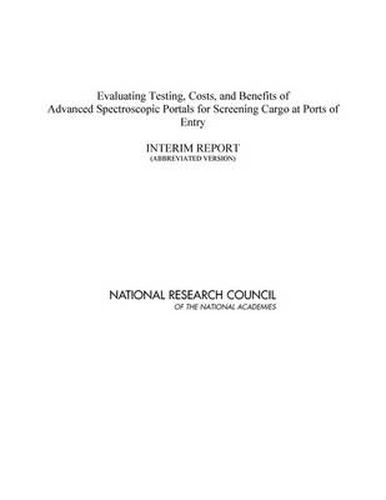Readings Newsletter
Become a Readings Member to make your shopping experience even easier.
Sign in or sign up for free!
You’re not far away from qualifying for FREE standard shipping within Australia
You’ve qualified for FREE standard shipping within Australia
The cart is loading…






To improve screening of containerized cargo for nuclear and radiological material that might be entering the United States, the Department of Homeland Security (DHS) is seeking to deploy new radiation detectors, called advanced spectroscopic portals (ASPs). The ASPs are intended to replace some or all of the current system of radiation portal monitors (called PVT RPMs) used in conjunction with handheld radioisotope identifiers (RIIDs) to detect and identify radioactive material in cargo. The U.S. Congress required the Secretary of Homeland Security to certify that ASPs will provide a ‘significant increase in operational effectiveness’ over continued use of the existing screening devices before DHS can proceed with full-scale procurement of ASPs for deployment. Congress also directed DHS to request this National Research Council study to advise the Secretary of Homeland Security about testing, analysis, costs, and benefits of the ASPs prior to the certification decision. This interim report is based on testing done before 2008; on plans for, observations of, and preliminary results from tests done in 2008; and on the agency’s draft cost-benefit analysis as of October 2008. The book provides advice on how DHS’ Domestic Nuclear Detection Office (DNDO) can complete and make more rigorous its ASP evaluation for the Secretary and the nation.
$9.00 standard shipping within Australia
FREE standard shipping within Australia for orders over $100.00
Express & International shipping calculated at checkout
To improve screening of containerized cargo for nuclear and radiological material that might be entering the United States, the Department of Homeland Security (DHS) is seeking to deploy new radiation detectors, called advanced spectroscopic portals (ASPs). The ASPs are intended to replace some or all of the current system of radiation portal monitors (called PVT RPMs) used in conjunction with handheld radioisotope identifiers (RIIDs) to detect and identify radioactive material in cargo. The U.S. Congress required the Secretary of Homeland Security to certify that ASPs will provide a ‘significant increase in operational effectiveness’ over continued use of the existing screening devices before DHS can proceed with full-scale procurement of ASPs for deployment. Congress also directed DHS to request this National Research Council study to advise the Secretary of Homeland Security about testing, analysis, costs, and benefits of the ASPs prior to the certification decision. This interim report is based on testing done before 2008; on plans for, observations of, and preliminary results from tests done in 2008; and on the agency’s draft cost-benefit analysis as of October 2008. The book provides advice on how DHS’ Domestic Nuclear Detection Office (DNDO) can complete and make more rigorous its ASP evaluation for the Secretary and the nation.